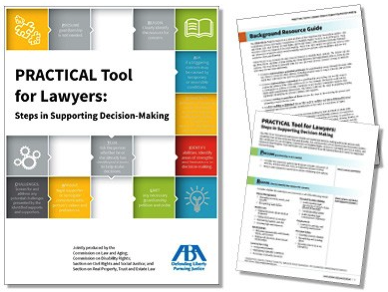Legal Resources
Conservator
The study of capacity in seniors over the past 40 years has yielded a good deal of information. A good overview article is Assessment of Capacity in an Aging Society written by Dr. D. Marson et al., the author of the Financial Capacity Instrument (FCI) which is emerging as an important measure of decisional financial capacity.
Another good article published in JAMA in 2011 is Finances in the Older Patient with Cognitive Impairment, again with Dr. Marson as one of the authors. They offer a useful definition of financial capacity as “the ability to manage money and financial assets in ways that meet a person’s needs and which are consistent with his/her values and self-interest.” There are many types of capacity (driving, medical decision-making, sexual consent, medication refusal, etc.), but financial capacity gets the most attention in America's courts.
At the national level, the American Psychological Association (APA) has taking a lead in setting the best practices for assessing the capacity of older adults, since 2003, producing the following 70 page manual:
In 2005 the APA and ABA went on to jointly produce a 79 page handbook for attorneys:
The APA and the ABA then collaborated with the National College of Probate Judges with the American Psychological Association to produce in 2006 a handbook for use in probate court:
In 2008, the APA established guidelines for testamentary capacity and consent to treatment by working in collaboration with the American Bar Association Commission on Law and Aging (ABA) to produce a handbook for psychologists doing this work. The handbook dedicates a chapter to undue influence. It also reviews legal, scientific, and practice issues for six areas of capacity often addressed by the courts—testamentary capacity, driving capacity, medical consent, sexual consent, and independent living:
There are additional excellent resources by organizations such as the Veteran's Administration, which has always taken a lead in representing the interests of aging Americans. The VA produced this 73 page guidebook in 1997:
The PRACTICAL Tool aims to help lawyers identify and implement decision-making options for persons with disabilities that are less restrictive than guardianship. “PRACTICAL” is an acronym for nine steps for lawyers to identify these options. The lawyer can use the PRACTICAL checklist of steps during the client interview and immediately after to assist in case analysis. The steps blend in

The PRACTICAL Tool is available for download, and has a nifty tool that can be downloaded or used as a fillablePDF. It is a bit simplistic, but it can serve as documentation of an attorney's screening of capacities with older clients who are making decisions. Remember the "Golden Rule?" Of course, if it triggers concern in any area, then follow-up is needed.
In 1998 the Department of Veterans Affairs released a guide for five steps in capacity assessment: referral clarification, general assessment planning, assessment, synthesis of data and communication of findings, and follow-up evaluation.
A Practice Guideline for Assessment of Competency and Capacity of the Older Adult. American Psychological Association (APA) available for purchase for $11.95 by members of the APA.
Guidelines for Psychological Practice with Older Adults. American Psychological Association (APA). Approved as APA Policy in August, 2003.
Assessment of Older Adults with Diminished Capacity: A Handbook for Lawyers. American Bar Association (ABA) & the American Psychological Association (APA), 2003. Judicial Determination of Capacity of Older Adults in Guardianship Proceedings: A Handbook for Judges. ABA, APA, with the National College of Probate Judges, 2006.
Assessment of Older Adults with Diminished Capacity: A Handbook for Psychologists. American Psychological Association (APA) & the American Bar Association (ABA), 2008.
Assessment of Competency and Capacity of the Older Adult: A Practice Guideline for Psychologists. National Center for Cost Containment Dept. of Veterans Affairs, March, 1997.
Clinical assessment for competency determination: A practice guideline for psychologists